Additional Guidance for Determining Whether an Employee is a
Critical Worker
The below guidance is intended to give additional guidance only
do not copy any of this information
into any correspondence with a client.
An immigration officer who is a National Manager in BVO will determine who is an ‘other critical
worker’. Critical Workers can be divided into two separate groups- those employees who are
required to come to New Zealand for less than 6 months and those required to come for 6 months
or longer.
Act
It is important to understand how long the employee is intending to be in New Zealand as this wil
guide which set of instructions you apply:
6 MONTHS OR LESS:
This group must have:
- Unique experience and technical or specialist skills that are not readily obtainable in New
Zealand OR
- Are undertaking a time-critical role which is:
Information
• For the delivery of an approved major infrastructure project OR
• For the delivery of an government approved event OR
• For the delivery of an major government-approved programme OR
• Is in support for an approved government-to-government agreement OR
• Has significant wider benefit to the national or regional economy.
MORE THAN 6 MONTHS
the Official
This group must meet one of the above requirements AND
- Earn at least $106,080 per annum OR
- Have a role that is essential for the completion or continuation of a science programme
under a government funded or partial y government-funded contract, including research
and development exchanges and partnerships, and has the support of MBIE Science,
Innovation and International Branch to travel to New Zealand to carry out their work OR
- Be undertaking a role that is essential for the delivery or execution of:
• A government-approved event OR
• A major government-approved programme OR
• An approved major infrastructure project.
Factors that may be taken into account when determining whether a person is an ‘other critical
Released under
worker’ include:
- Why that person is needed to ensure the delivery, continuity or execution of the work or
service, and the effect on the work or service if the person was unable to come; and
- Why it is not possible to re-deploy workers already in New Zealand (this could include time
constraints or the specific nature of the work or service to be done); and
- The situation of the staff (if any) currently performing the role(s), and whether they can
remain or not in the roles; and
- The length of the visa required and the reason for that length of visa.
- Why now? What is the urgency/exceptional circumstance requires them to be exempt from
border restrictions?
What is unique experience and technical/specialist skil s?
Unique or specialist skills include, but are not limited to, whether these skil s or experience:
• Have been gained in a specialist training institution or by working in a highly specialist firm.
• Can be demonstrated through global experience.
Act
• Are inherent to a person.
What should I consider when making this assessment?
Factors to consider include, but are not limited to, whether:
• There are no workers in the country who could perform the role OR
• There is a very limited pool of available workers who could perform the role and they are
not available to the employer.
• Consider whether or not relevant training, formal education or work experience can be
gained in New Zealand.
Information
• Applications for seasonal workers will generally not be approved under these instructions.
The only exceptions will be if the nature of the work is highly skilled or uniquely specialised.
• Examples of workers meeting this standard may include: some highly specialist
veterinarians, vendor-appointed engineers required to install major equipment, or an actor
in a key film role.
How do we know these skil s are not readily obtainable in NZ?
the Official
• Refer to the information provided by the employer and outline this in the assessment
template.
• There are three checks that should be completed (listed in ‘processing tips’ below) when
assessing these EOIs. Consider how credible the information given is compared to the
information found by doing these checks.
• Consider if the employer has made any attempts to recruit locally.
What is a ‘time-critical’ role?
• "Time critical" includes if the person does not come to New Zealand, the project, work or
event will cease or be severely compromised, or significant costs will be incurred.
• Does this person need to be here before the New Zealand borders open?
Released under
• There is no specific timeframe set on this, however the employee needs to be essential to
the starting, continuation or completion of the work/project.
What is an approved major infrastructure project?
• There is a specific list, outlined in instructions H5.30.10.
How do we determine if the role is time-critical for work which brings significant wider benefit to
the national or regional economy?
• Consider the impact of this person not coming to New Zealand to fulfil their role- will the
project be stal ed or unable to be completed entirely?
• Mention if the employer has listed a dollar value for the project and the employee’s
contribution to it.
• What is the outcome of the employee completing this role?
• Consider if the economic impact is projected/estimated vs. proven.
• Consider how the person contributes to the work/project in a wider context.
Act
EOI Processing Tips
1. As a starting point, the fol owing checks should be done when assessing the EOI:
- Look up the Clients Contacts Report (CCR) for the employer
- Check Companies Office to confirm the company’s existence/history
- Do a general Google search on the company/refer to their website.
2. The NZBN should be listed in the Plone submission, the company’s AMS client record, and
can be found on the Companies Office website.
Information
3. Conduct a name/NZBN search for the employer and link any existing ID’s.
4. Complete the contact tab
5. Information warnings or concerns should be noted and reflect in the assessment template in
the ‘any other notes’ section.
6. An employment agreement does not need to be sighted at EOI stage, however wil be
requested when an ITA is issued.
7. Please note that a high wage (i.e. above the median salary) does not necessarily reflect the
need for that employee to travel to New Zealand.
8.
the Official
You may request for further information if no/minimal information is provided on Plone.
Fil ing out the Template
Summary of the work the business undertakes
This can include:
- Industry/sector the business operates in
- Scope of the business (employee size, number of sites in NZ/offshore)
- How many people are currently doing the role?
- Product/service they provide
- Any specific projects the business is involved in currently e.g. creation of a COVID-19
vaccine.
Released under
Application Processing Tips
VISA CONDITIONS AND VALIDITY
- Under these instructions, an applicant can be granted a Critical Purpose Visitor Visa
for up to 6 months OR a maximum of 12 months where a CXR has been provided
(unless from the applicant is from a low TB country list in A9.25.10).
CRITICAL PURPOSE VISITOR VISAS
- Unless there is a compelling reason otherwise, CP VVs should be granted as single
entry visas. If you think a multiple entry visa should be granted, consult a Technical
Advisor
CRITICAL PURPOSE VARIATION OF CONDITIONS
- A Critical Purpose Variation of Conditions can be granted for a duration in line with
the substantive visa.
- If the visa has been activated, the CP VOC should not be given a first entry date, they
should be given an expiring date in line with their substantive visa.
Act
- If the visa has not been activated, the CP VOC wil require a 6 month F/E date
- CP VOCs should be granted as multiple entry and in particular, it is important to
ensure that
Work to Residence visas are granted as multiple entry.
Frequently Asked Questions
#
Question
Respondent
Answer
1. Do AMS notes need to be entered for Henderson Office
No.
al of the employees included in the
EOI?
At EOI stage, a client ID and
Information
AMS notes only needs to be
created for the employer.
2. The employer has mentioned that
Henderson Office
We require the employee(s)
their employee wishes to bring their
(and their dependents) name
dependents, however has not
at EOI stage.
the Official
provided their details.
To do this- contact the
employer directly.
3. One employee appears to meet
Henderson Office
If one employee appears to
Critical Worker requirements but not
meet Critical Worker
the other. What do I do?
instructions but not another,
this will need to be clear in
the assessment template.
Move the MAKO folder into
the ‘MIXED OUTCOME’ folder.
Released under
4. I don’t know much about the sector
Henderson Office
Yes, this an option, however
the employer operates in. Can I
contact your Immigration
contact a lead agency for advice?
Manager in the first instance.
5. The employee has requested an
Henderson Office
Citizens and residents who
exception for their New Zealand
have been in NZ as residents
Act
citizen/resident employee. Do I
can be refused outright as
proceed with the assessment?
citizens can’t be granted a
visa, and ‘activated’ residents
don’t need to be approved as
critical workers.
“EOI NOT CONSIDERED:
The request cannot be
considered under COVID
19 travel ban exception
Information
process as the NZ border
remains closed for all
apart from NZ citizens
and residents who are
returning to NZ.”
Offshore residents who have
not had their residence visas
activated still require a critical
purpose to travel to New
the Official Zealand so may still apply
through this process.
6. The employee appears to meet other Henderson Office
Consult a TA in the first
Critical Purpose instructions (e.g.
instance.
Critical Health Worker, Ordinarily
Resident Australian), can I issue an
We can ITA on the other
ITA straight away on this basis?
grounds, however we must be
relatively certain that they
meet the requirements of the
other category.
7. The employer has stated they won’t
Henderson
Ensure this information is
pay for the quarantine requirements
captured in the assessment
Released under
for their employee.
template under ‘any other
notes’.
8. I have located the employee in AMS
Henderson Office
You will need to outline this in
and note that they have serious a
the referral assessment.
bona fide/character/health issue but
potentially meets a critical purpose.
9. The employee earns above the
Henderson Office
Yes- there is no hourly rate for
median salary but this is based on a
this salary requirement.
Act
60 hour work week. Does this meet
requirements?
10. An EOI has been refused previously,
Henderson Office
Yes, every new EOI requires a
do I need to assess their subsequent
new assessment. Sometimes
one again?
in subsequent EOIs,
Information
employers may provide more
information that changes the
outcome.
Consider what new
information has resulted in
requirements now being met
11. Should I be requesting for
Henderson Office
In some instances, it may be
information at EOI stage?
necessary to request further
information to proceed,
the Official however this will be
considered on a case by case
basis.
Requests for information
should be given a response
timeframe of
48 hours.
Released under
Visa Conditions and Validity
• Under these instructions, an applicant can be granted a Critical Purpose Visitor visa for up to
6 months OR a maximum of 12 months provided a CXR isn’t required.
• A Critical Purpose Variation of Conditions can be granted for a duration in line with their
substantive visa.
• Generally, Critical Purpose Visitor visas should be granted as single entry visas. If you think a
multiple entry visa should be granted, consult a Technical Advisor.
• Variation of Condition visas should be granted as multiple entry- if the visa is activated do
not put a first entry date on it.
Act
Validity
• If the applicant is a dependent of a Critical Worker, the visa they are granted should not be
valid for longer than their partner’s visa in New Zealand.
• There are some visa types that will lose their original visa conditions if a Critical Purpose
Variation of Conditions is raised on top of their original visa. This is because their ‘expiry
date stay’ date cannot be altered in AMS. In these cases, a Critical Purpose Visitor visa will
Information
need to be raised and the applicant informed that their original visa conditions (multiple
entry) will not apply to the new visa.
• For those who meet the ‘under 6 month’ requirement but are staying for a much shorter
period, e.g. 6 weeks, still issue a 6 month visa. This is due to the current issues with flight
availability.
the Official
Conditions
• Any applicant approved under the Critical Worker category, their employer and occupation
must be recorded on the visa label.
What if the applicant appears to meet other Critical Purpose criteria?
• As we do not have sufficient information that is needed to re-raise the new EOI we process
as normal and make a note in the referral assessment that they likely meet [Critical Purpose
Released under
category]. If the outcome of the referral is not successful, the support team can inform them
that may test their eligibility under other CP criteria when we email them with the decision
letter under Other Critical Worker.
Additional Guidance for Employer Border Exemption Inbox
Procedure
The below guidance is intended to give additional guidance only
do not copy any of this information
into any correspondence with a client.
We receive emails from employers and advisers through our email inbox:
[email address]
Act
We receive emails primarily regarding employer border exceptions. It is preferable that these are
responded to within 24-48 hours where possible, although some queries may be urgent and require
swifter action.
Some of the common enquiries and their responses are as follows:
RECONSIDERATION REQUESTS
Information
We regularly receive emails from employers or advisers requesting reconsideration when a request
has been declined. We provide some information relating to the reconsideration process in our
decline emails, but we do not actively encourage or facilitate employers to submit a reconsideration
request merely because their request has been declined.
In order to accept a request for reconsideration, new and compelling information that was not
provided in the original request must be provided, and must be provided promptly.
If a significant amount of time has elapsed since the decision and an employer/adviser is enquiring
the Official
about their options for the first time, do not provide the option of a reconsideration as it would not
be accepted. Instead direct them to submit a new request.
If the enquiry is recently after the decision, you may give them the option, but it is best to provide a
specific timeframe for when they must provide this information. If new and compelling information
has not yet been provided, one week is a reasonable amount of time to provide to ensure that it is
provided promptly. If longer is needed, consideration can be given to the circumstances and
whether this is reasonable.
New and Compel ing
When considering whether to accept a reconsideration request, you must consider whether the
Released under
information provided is both
new and
compel ing. This means that the information must not have
been provided in the original request, and it must be substantial enough that it may have an impact
on an assessment of the relevant immigration instructions, H5.30.5(a)(i) and (ii).
When considering this, you should look at the assessment of the previous request to find the core
reasons for the decline and any concerns the immigration officer or National Manager have raised.
New information should ideal y address these concerns (or demonstrate how another instruction is
met), or at least factor into the assessment of the appropriate instructions.
An example of this would be an employer who provides evidence of having advertised for a position
in New Zealand and being unable to source local workers. This would be a relevant consideration for
a request that was previously declined under H5.30.5(a)(i), so a reconsideration request would likely
be accepted; however it wil depend on the reasons for the decline.
Noting all of the above, remember that you are not the immigration officer assessing a request in
Act
order to recommend a decision. You are not conducting a full assessment of the new information
and whether you believe that the request now meets instructions; you are only conducting a face
value check of whether the new information is likely to be relevant in addressing the concerns noted
in the previous decision.
Process if Accepted
If you are accepting a reconsideration for consideration, you should:
• Raise a new application in AMS under Special, Expression of Interest, Border Exceptions
Information
Request (Business or Agency). Link the new application to the original request that was
declined.
• Process lodgements and place in the ‘Queue, CW Recon’ case manager. An Immigration
Manager will need to waive the fee.
• Place the new information (or the email received) in the same MAKO folder as the originally
declined request – this should be marked as information for a reconsideration.
• Rename the MAKO folder to include “RECON ANXXXXXXXX” at the end, so that both
application numbers are included in the folder name. Move the MAKO folder to the
the Official
“Reconsiderations” folder.
QUERIES
Application Update
When an email is received requesting update on a request, please check the AMS notes and MAKO
folder to determine its current status. Once this is confirmed, respond back to the email advising
where it is in the process. Please be careful in ensuring if that we are only responding to the
authorised parties.
Released under
It is best not to promise an outcome within a specific timeframe where possible. We advise that
most requests are decided within two weeks, but we would not provide a specific date unless there
is certainty that there wil be an outcome by then.
Decline Clarification
Due to the generic nature of our decline letters, employers/advisers will often seek clarification as to
the reasons for the decision.
The summary of the assessment in MAKO should give an indication of the reasons instructions were
not met, along with any additional comments from the National Managers. These reasons can be
provided to the employer/adviser.
Other Queries
A number of other queries are received, such as questions about individual EOIs or MIQ. These can
be directed to the appropriate avenues (e.g. INZ website, MIQ website, ICC).
Act
Many other simple queries can be answered by information on INZ’s website page for employers:
https://www.immigration.govt.nz/about-us/covid-19/covid-19-information-for-employers
Information
the Official
Released under
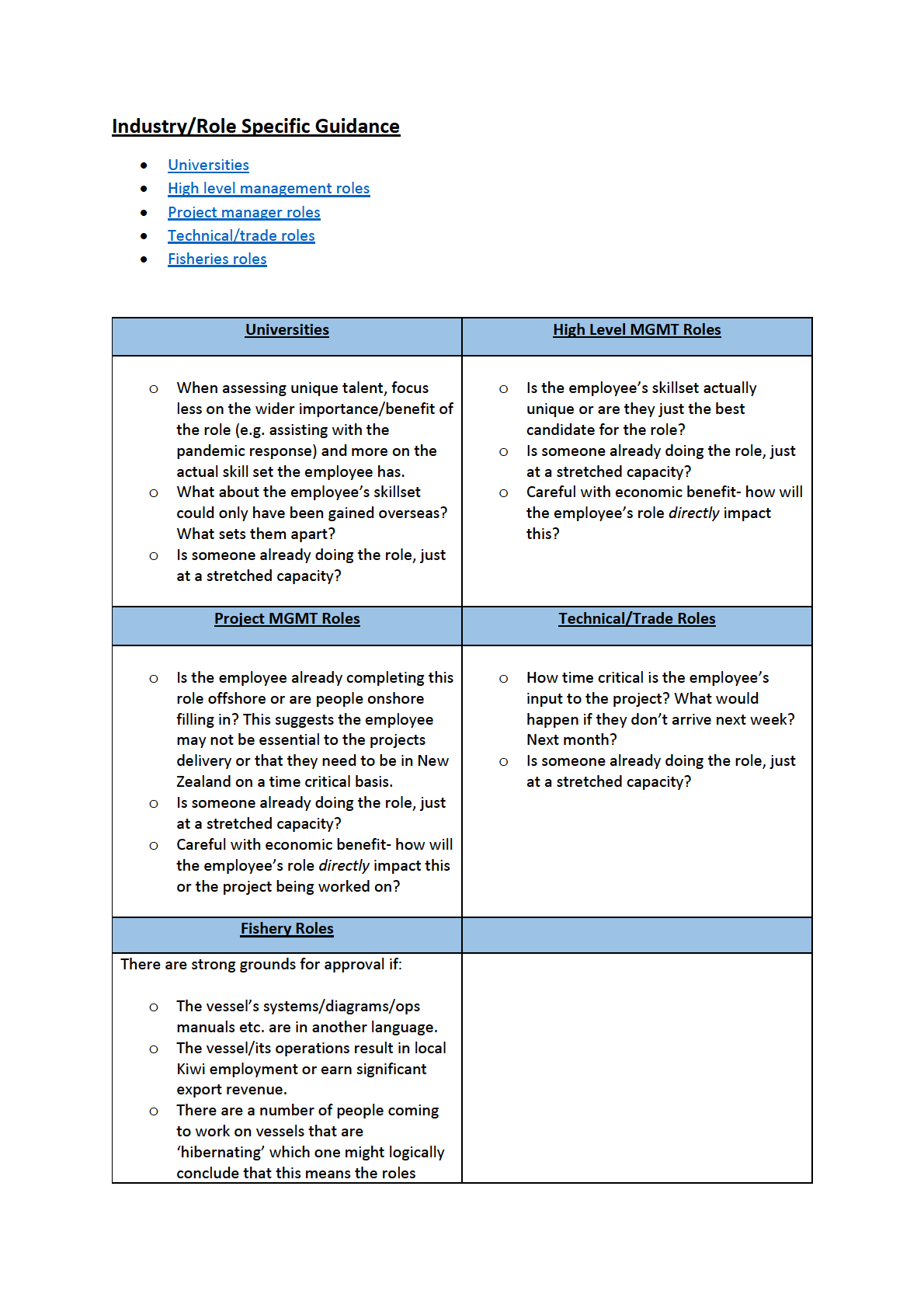
Act
Information
the Official
Released under
aren’t time critical. However, the
vessel’s ‘readiness’ to jump back out to
sea at any moment is the time critical
factor here and the crew need to be on
board to ensure this.
o There may be specific
bilateral/international agreements that
require the presence of certain roles on
vessels- this is sufficient to indicate the
role is time critical, unique and has a
wider economic benefit.
Act
UNIVERSITY LECTURERS/EMPLOYED BY UNIVERSITIES
DECISIONS OVER-TURNED
Employer
CN 20194667 Section 9(2)(a) University
Time requested
Less than 6 months
Information
Role
Senior Lecturer
Relevant instructions
H5.20.5 (a) (i) (unique/technical/specialist)
H5.20.5 (a) (ii) (time critical role with wider benefit)
Decision recommended
Approval
Decision made by National Manager Decline
Employer has hired a Senior Lecturer inSection 9(2)(a) that will also provide Section 9(2)(a)
the Official
throughout the Section 9(2)(a) session. The role requires a
Section 9(2)(a)
The employer claimed no one in New Zealand has the level of specialist
training/experience/expertise that the employee has.
The role is time critical given the short-term nature of theSection 9(2)(a) season.
Decision over-turned because:
o Insufficient evidence provided by the employer to demonstrate these specific skills aren’t
obtainable in New Zealand- what about the employee’s skil set and experience could only
have been gained overseas?
o Why the role may be time critical- how does it benefit the wider economy?
Released under
Employer
CN20194981 The University Section 9(2)(a)
Time requested
More than 6 months
 Role
Role
Lecturer
Relevant instructions
H5.20.5 (a) (i) (unique/technical/specialist)
H5.20.5 (b) (ii ) (MBIE science)
Decision recommended
Approval
Decision made by National Manager Decline
Employer has hired a Lecturer inSection 9(2)(a) which involves training Section 9(2)(a) workers in
Section 9(2)(a) , lecturing post-graduate Section 9(2)(a) students in Section 9(2)(a)
, serve on
governance groups and undertake research. Role currently being completed by staff ‘covering the
workload’.
Act
Employer claimed that these skills were unobtainable in New Zealand because they require the
candidate to hold a PhD and have experience in delivering Section 9(2)(a) content. The Section 9(2)(a)
experience was stated to be important given its current use in the pandemic. Employee has
experience as a
Section 9(2)(a)
.
Employer would be working on the MBIE science project to al eviate the workload of the current
staff.
Noted employee earns less than the median wage requirement.
Information
Decision over-turned because:
o Insufficient evidence provided by the employer to demonstrate these specific skills aren’t
obtainable in New Zealand- role is already being covered by existing staff, albeit at stretched
capacity.
o When assessing unique talent, focus less on the wider importance/benefit of the role (e.g.
assisting with the pandemic response) and more on the actual skill set the employee has.
the Official
University Section 9(2)(a)
(Lecturer)- Decline.p
Employer
CN20194981 The University Section 9(2)(a)
Time requested
More than 6 months
Role
Research Fellow
Relevant instructions
H5.20.5 (a) (i) (unique/technical/specialist)
H5.20.5 (b) (ii ) (MBIE science)
Released under
Decision recommended
Approval
Decision made by National Manager Decline
Employer requires employee in a specialist research fellow role to undertake research on anSection 9(2)(a)
Section 9(2)(a) programme.

Employee holds a PhD and has the requisite Section 9(2)(a) experience. Employee is an award winning
graduate at a top ranked university in Section 9(2)(a). Employee will work directly on a MBIE funded science
programme in Section 9(2)(a) .
Role is currently being temporarily filled by a PhD graduate. Research on the MBIE science program
is being completed- but at a stretched capacity.
Decision over-turned because:
o Noted the skil s and experience of the employee, however the employer hasn’t
demonstrated that there are any Section 9(2)(a) in New Zealand that could take up the role.
Referral states there is a ‘small pool of Section 9(2)(a) in New Zealand’. Referral also states that a
Act
PhD graduate is in this role temporarily.
o While employee is contributing to an MBIE science programme, it hasn’t been demonstrated
that the employee’s role is critical to its delivery.
o Careful with contradictory rationale- there is someone currently in this role and employer
has stated there is a small pool of people in New Zealand that could perform the role, just
not to the level of the employee.
o As above, careful when assessing unique talent- it’s not about the importance of the role
itself (assisting with
re
Section 9(2
search is obviously very important right now), it’s about
demonstrating that this person’s skil set is unique.
Information
University Section 9(2)(a)
(Research Fel ow) - D
Employer
CN21291744 The University Section 9(2)(a)
Time requested
More than 6 months
the Official
Role
Lecturer
Relevant instructions
H5.20.5 (a) (i) (unique/technical/specialist)
H5.20.5 (b) (i ) (salary)
Decision recommended
Approval
Decision made by National Manager Decline
Employee to be hired as a Senior Lecturer in the School of Section 9(2)(a) Employer claims
employee is one of very few people specialised in the field of Section 9(2)(a)- role requires relevant
PhD and 5 years research experience. Will be lecturing a qualification that is not otherwise available
in New Zealand.
Employer has claimed that employee wil attract more PhD students to the university, benefitting
Released under
the economy.
Employee has been working remotely.
Decision over-turned because:
o Insufficient evidence provided by the employer to demonstrate these specific skills aren’t
obtainable in New Zealand- what about the employee’s skil set and experience could only
have been gained overseas?


sity of
Section 9(2)(a) Decline.p
DECISIONS UP-HELD
Employer
CN21291744 The University Section 9(2)(a)
Time requested
More than 6 months
Act
Role
Lecturer
Relevant instructions
H5.20.5 (a) (i) (unique/technical/specialist)
H5.20.5 (a) (ii) (time critical role with wider benefit)
H5.20.5 (b) (ii) (salary)
Decision recommended
Decline
Decision made by National Manager Decline
Employee to be hired as a Lecturer in Section 9(2)(a) Studies. Employee to be involved in developing
Section 9(2)(a) training programmes and consulting on government’s initiatives to improve public
Information
service interpreting. Employer claims the programme will have a wider benefit to the economy given
the training programme will attract more students and the interpreting profession is an essential
support role.
o Insufficient evidence provided by the employer to demonstrate these specific skil s
aren’t obtainable in New Zealand.
o Employee does not met remuneration threshold.
o Role isn’t time critical.
the Official
sith of
Section 9(2)(a) (Lecturer)
Employer
CN20063052 University Section 9(2)(a)
Time requested
More than 6 months
Role
Lecturer
Relevant instructions
H5.20.5 (a) (i) (unique/technical/specialist)
H5.20.5 (b) (ii) (salary)
Decision recommended
Approve
Released under
Decision made by National Manager Approve
Employee to be hired as Dean of the School of
Section 9(2)(a)
division. Employee has bought in over
m
Section 9(2)(a)
illion dollars of new funding forSection 9(2)(a)
initiatives throughout her career and has received national recognition as a Section 9(2)(a)
for significant service to Section 9(2)(a) education. Remuneration is $
P
Section 9(2)(a
/A.


o Employee has skil s that could only have been obtained outside in New Zealand and
are unique in their speciality.
o Remuneration indicates level of specialist skill.
Section 9(2)(a)
Act
HIGH LEVEL MANAGEMENT ROLES
DECISIONS OVER-TURNED
Employer
CN74917424 Section 9(2)(a) Limited
Time requested
More than 6 months
Information
Role
General Manager
Relevant instructions
H5.20.5 (a) (i) (unique/technical/specialist)
H5.20.5 (a) (ii) (time critical role with wider benefit)
H5.20.5 (b) (ii) (salary)
Decision recommended
Approval
Decision made by National Manager Decline
Employer manufactures Section 9(2)(a) for export and sale in New Zealand. Employee’s
the Official
knowledge of Section 9(2)(a)manufacturing and supply chains as wel as the Section 9(2)(a)
language/culture listed as reasons the employee’s skil set is unique.
Referral outlines there is insufficient information to determine whether the role is time critical and
will benefit the wider economy. Referral highlights the business has lost NZD$ K
Section in the past 12
months due to supply chain issues. Business may risk losing new contracts that employee has
secured.
Decision over-turned because:
o National Manager has acknowledged that language is an important skill for an employer,
however the referral doesn’t support how this skillset is unobtainable in New Zealand.
o Further noted business losses have been over the past 12 months which cannot be directly
attributed to the employee not being in the role given they were only offered the role in
Released under
2020.
Section 9(2)(a)
 Employer
Employer
CN75621949 Section 9(2)(a)
Time requested
More than 6 months
Role
Director
Relevant instructions
H5.20.5 (a) (i) (unique/technical/specialist)
H5.20.5 (a) (ii) (time critical role with wider benefit)
H5.20.5 (b) (ii) (salary)
Decision recommended
Approval
Decision made by National Manager Decline
Act
A Director of aSection 9(2)(a) services company provided funding to small/medium sized enterprises in
New Zealand submitted an EOI for himself.
He has over 20 years’ experience in the finance industry
and is stated that the business will generate $Section 9(2)(a)million in its economic contributions and 300-
4500 jobs in NZ.
He earns a salary of $Section 9(2)(a) p/a.
Decision over-turned because:
o We have someone who is incredibly skil ed and important for the business but not
uniquely
Information
skilled.
o The NM has noted that while the employee may build a business that wil contribute to the
economy, this appears speculative at this stage and not time critical.
Section 9(2)(a) –
Decline .pdf
the Official
Employer
CN75607547 Section 9(2)(a)
Time requested
More than 6 months
Role
Co-Founder/Director
Relevant instructions
H5.20.5 (a) (i) (unique/technical/specialist)
H5.20.5 (a) (ii) (time critical role with wider benefit)
H5.20.5 (b) (ii) (salary)
Decision recommended
Approval
Decision made by National Manager Decline
Co-founder/director of a company that develops
Section 9(2)(a)
products. They have
Released under
developed patented Section 9(2)(atechnology, have the support of NZTE, have completed several years of
testing and planning in Section 9(2)(a)and are now ready to launch in New Zealand.
Product prototypes exported out of Section 9(2)(a) have been planning a return to New
Zealand since Section 9(2)(a)
Decision over-turned because:

o National Manager not satisfied the individual’s skillset is unique or that their role is time
critical.
o Don’t forget- instruction H30.5 (a) (i) requires an individual to have a
unique skil set. The
role/skill set they hold may be pivotal or vitally important to the business but this in itself
does not make it unique or unobtainable in New Zealand.
o The focus here was too much on the importance of the individual’s role within the business-
they are a co-founder and director, they are certainly vital for the business’ operation but
their actual skill set, business development and strategy is not unobtainable in New Zealand.
Act
Section 9(2)(a)
Decline.pdf
Information
Employer
CN27265596 Section 9(2)(a)
Time requested
More than 6 months
Role
Senior Manager
Relevant instructions
H5.20.5 (a) (i) (unique/technical/specialist)
H5.20.5 (a) (ii) (time critical role with wider benefit)
H5.20.5 (b) (ii) (salary)
Decision recommended
Approval
the Official
Decision made by National Manager Decline
w
Section 9(2
ishes to bring in a Senior Manager on a permanent basis. Employee has vast experience and
education in Section 9(2)(a)services however this skillset is generalised.
Decision over-turned because:
o While the employee is skilled in his field and would be the best candidate for the role, it is
not that these skills are unobtainable in New Zealand. The skills the employee has are not
inherent to them and are all skills that could be found in New Zealand.
Released under
o Don’t forget- instruction H30.5 (a) (i) requires an individual to have a
unique skil set. The
role/skill set they hold may be pivotal or vitally important to the business but this in itself
does not make it unique or unobtainable in New Zealand. Management/consultant roles for
large corporations appear unlikely to meet H30.5 (a) (i) instructions based on the referrals
we’ve seen.


Section 9(2)(a)
- Decline - NM overtu
Employer
CN23177763 Section 9(2)(a)
Time requested
More than 6 months
Role
Managing Director
Relevant instructions
H5.20.5 (a) (i) (unique/technical/specialist)
Act
H5.20.5 (b) (ii) (salary)
Decision recommended
Approve
Decision made by National Manager Decline
Employee will be managing New Zealand office staff for a trust that specialises in the provision of
Section 9(2)(a) services forSection 9(2)(a). Employee has stated the employee is crucial
for the completion of a project with Section 9(2)(a), however limited information provided about this.
Employee has over 15 years’ experience in leadership roles including Section 9(2)(a)
.
Employer has also referred to her multilingual capabilities and knowledge of the Section 9(2)(a) market as
Information
being reasons the skillset is not obtainable in New Zealand.
Decision over-turned because:
o Acknowledged that salary requirements met, however not satisfied skil set is sufficiently
unique and could not be obtained in New Zealand.
the Official
Section 9(2)(a)
D
df
DECISIONS UP-HELD
Employer
CN59066630
Section 9(2)(a)
Time requested
More than 6 months
Role
Managing Director
Released under
Relevant instructions
H5.20.5 (a) (i) (unique/technical/specialist)
H5.20.5 (a) (ii) (time critical role with wider benefit)
H5.20.5 (b) (ii) (salary)
Decision recommended
Decline
Decision made by National Manager Decline
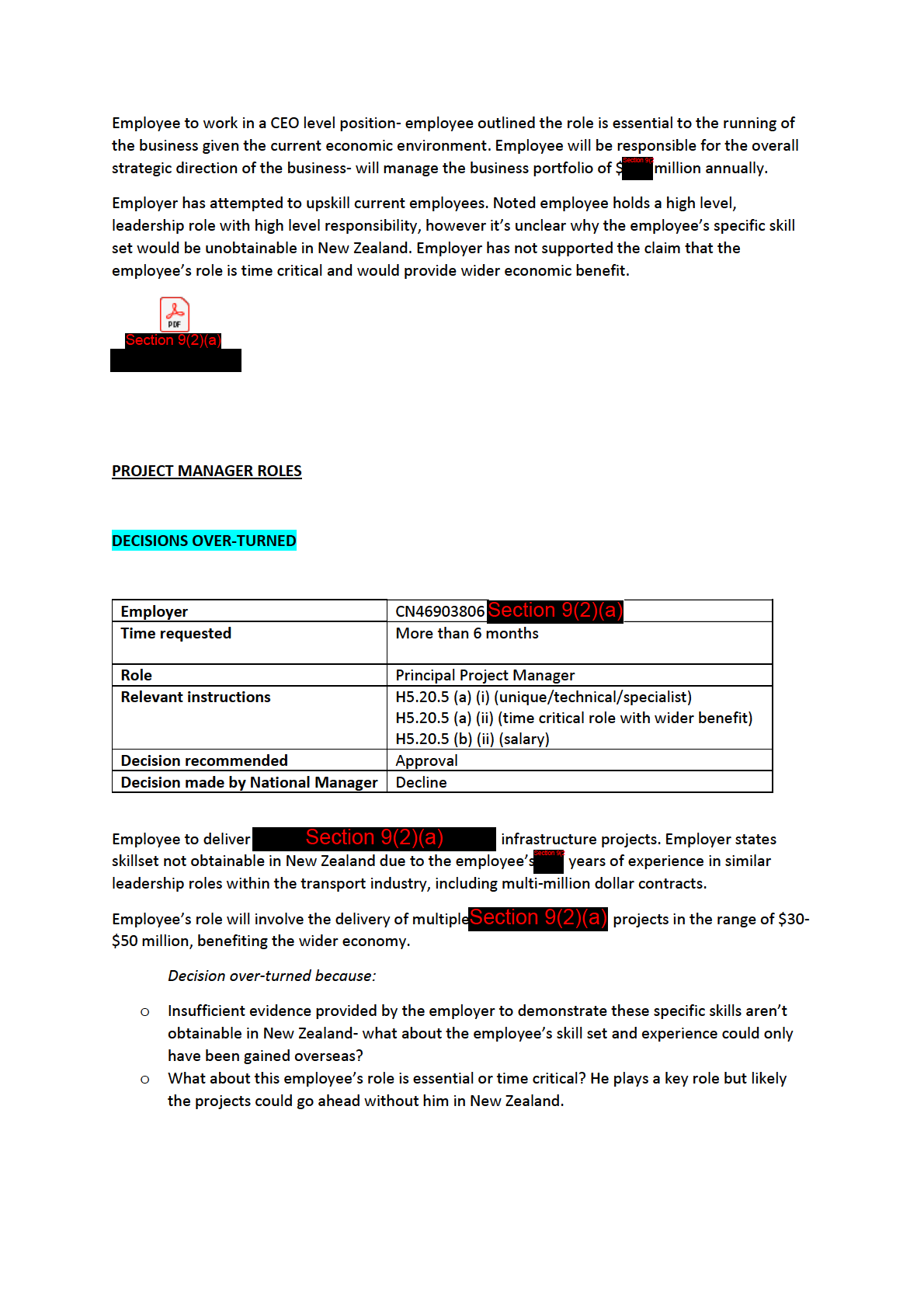
Act
Information
the Official
Released under


Section 9(2)(a)
DECISIONS UP-HELD
Employer
CN21107619 Section 9(2)(a)
Time requested
More than 6 months
Act
Role
Project Engineer
Relevant instructions
H5.20.5 (a) (i) (unique/technical/specialist)
H5.20.5 (a) (ii) (time critical role with wider benefit)
H5.20.5 (b) (ii) (salary)
Decision recommended
Decline
Decision made by National Manager Decline
Employee to work primarily on a project not on the approved projects list. Would be working on
Information
other approved projects but on a casual/part-time basis.
Employer has noted employee was the top candidate out of 100’s, however does not appear his role
is time critical. Employer has stated they will re-advertise should employee not be granted an
exception.
Section 9(2)(a)
Limited - Decline.pdf
the Official
Employer
CN22213439
Section 9(2)(a)
Time requested
More than 6 months
Role
Project Engineer
Relevant instructions
H5.20.5 (a) (i) (unique/technical/specialist)
H5.20.5 (a) (ii) (time critical role with wider benefit)
H5.20.5 (b) (ii) (salary)
Decision recommended
Decline
Decision made by National Manager Decline
Released under
Projects employee to work on are not on the approved list.
Employer has noted that the team would be stretched without the employee but wil continue.
Noted employees skill set specific to Section 9(2)(a) and Section 9(2)(a) projects as making him ideal
for the role.
Skill-set not unobtainable in New Zealand, nor could it have only have been gained overseas. There
are people in New Zealand fulfilling this role currently just at a stretched capacity.
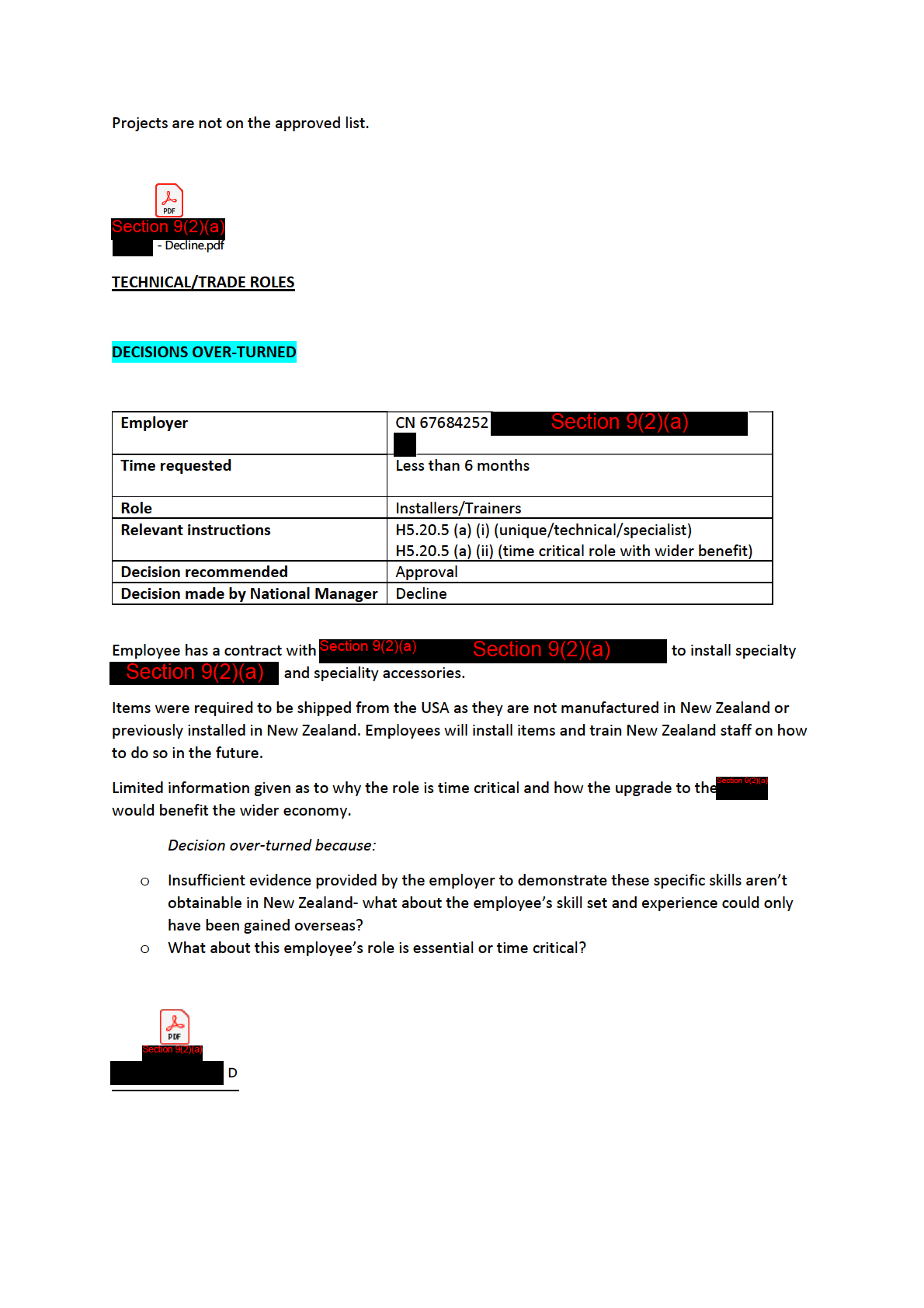
Act
Information
the Official
Released under
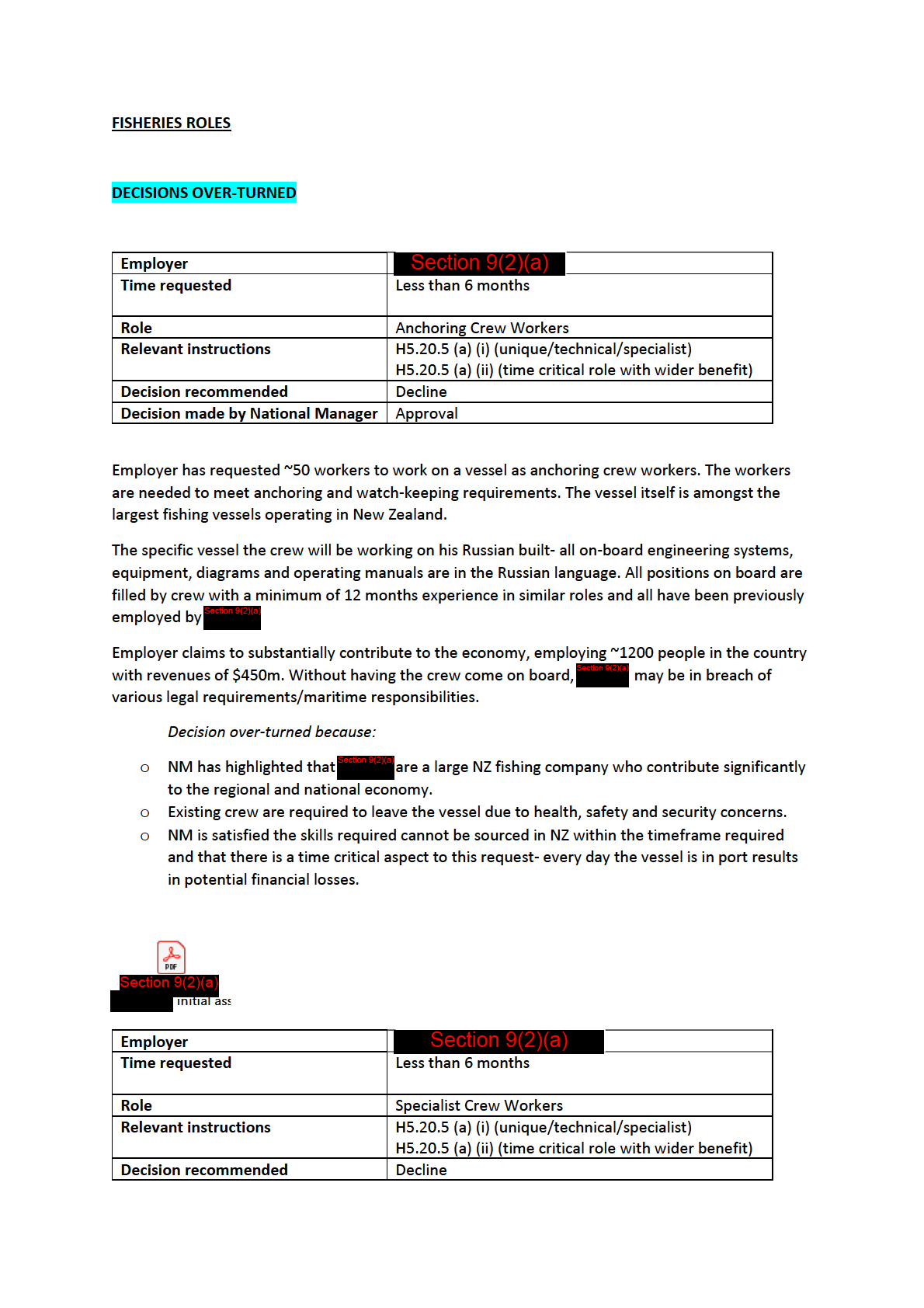
Act
Information
the Official
Released under
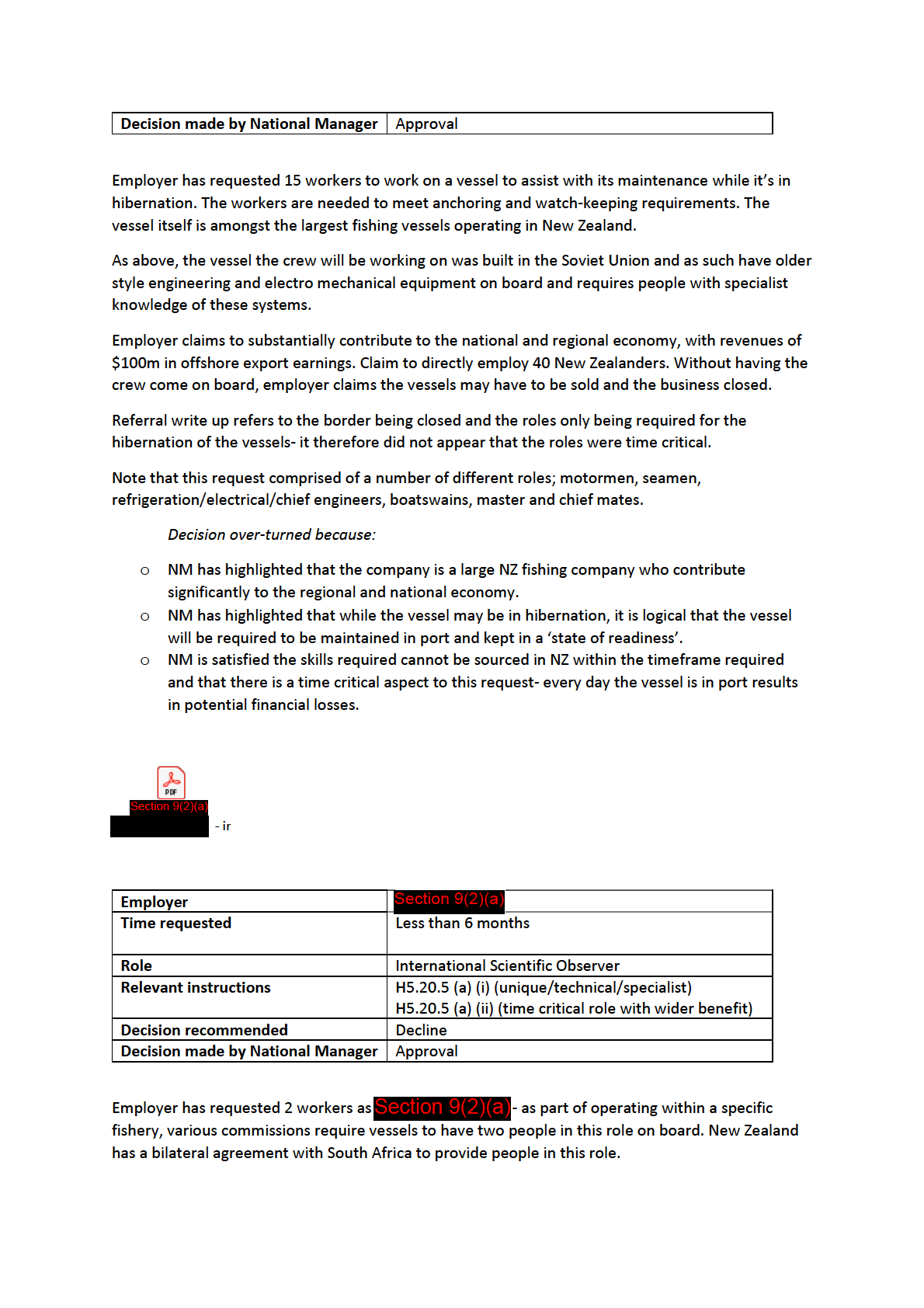
Act
Information
the Official
Released under


Without these workers, the vessel will be unable to sail from New Zealand which would result in the
loss of jobs for 50 crew.
The company has claimed that the international requirements of the commission/the bilateral
agreement with South Africa are government to government agreements, however these are not
listed under H5.30.15.
Decision over-turned because:
o While the above is not a specified government to government agreement, NM has
highlighted that the implications of the vessel not being able to fish in this fishery would be
significant for the regional economy through loss of revenue to New Zealand’s export
Act
economy and potential loss of local jobs.
o Instructions have been met through the role being time critical and having a wider benefit to
the economy.
Section 9(2)(a)
Approve - initial ana
Information
Employer
Section 9(2)(a)
Time requested
Less than 6 months
Role
Master Captain
Relevant instructions
H5.20.5 (a) (i) (unique/technical/specialist)
H5.20.5 (a) (ii) (time critical role with wider benefit)
Decision recommended
Decline
Decision made by National Manager Approval
the Official
Company provides shore side support, project management, maintenance and operational
management of superyachts. Employer has requested a Master Captain for a vessel currently
berthed in Auckland. Under current insurance guidelines, the tasks of the Master Captain can only
be legal y completed by them as they have been given Power-of Attorney.
If the employee cannot enter New Zealand, the vessel wil relocate to Section 9(2)(a)where a crew change
would result in the loss of local jobs and revenue to the local marine industry.
Decision over-turned because:
o NM has stated that because the tasks can only be legal y performed by this person, they are
satisfied they have skills/experience not obtainable in New Zealand.
Released under
Section 9(2)(a)
Approve.pdf
Assess Business EOI
When to use
Use this procedure to assess an employer or supporting agency’s expression of
interest (EOI) submitted via the online form accessible on the INZ website.
Context
Act
In March 2020 New Zealand’s border was closed in response to the COVID-19 global
pandemic with the immediate impact of stopping most non-New Zealanders from
travelling to New Zealand. A non-New Zealand citizen or resident wishing to enter
New Zealand while the border is closed must be able to demonstrate that they
meet the exception criteria as defined by INZ.
Role
Information
• Immigration Officer (IO)
• Secretariat Team
Prerequisites
• Logged into AMS
• Received a visa application under the ‘Special, Expression of Interest,
Border Exceptions Request (Business or Agency)’ in AMS
• Logged into Plone
the Official
Business EOIs land in the ‘Queue HAO, BE Business EOI’ queue.
Data entry will be completed by the Secretariat Team and a MAKO folder created
in which to save the submission documents.
The Secretariat Team will also paste a note in AMS with a link to the MAKO folder
for access by the IO.
Once these steps are completed, the EOI will be moved to the ‘Queue, CW Ready’
queue. They will be allocated to IOs by an IM from here.
Released under
Steps
1. Check AMS Workflow for any new EOIs that have been allocated to you
2. Open the corresponding EOI in Plone
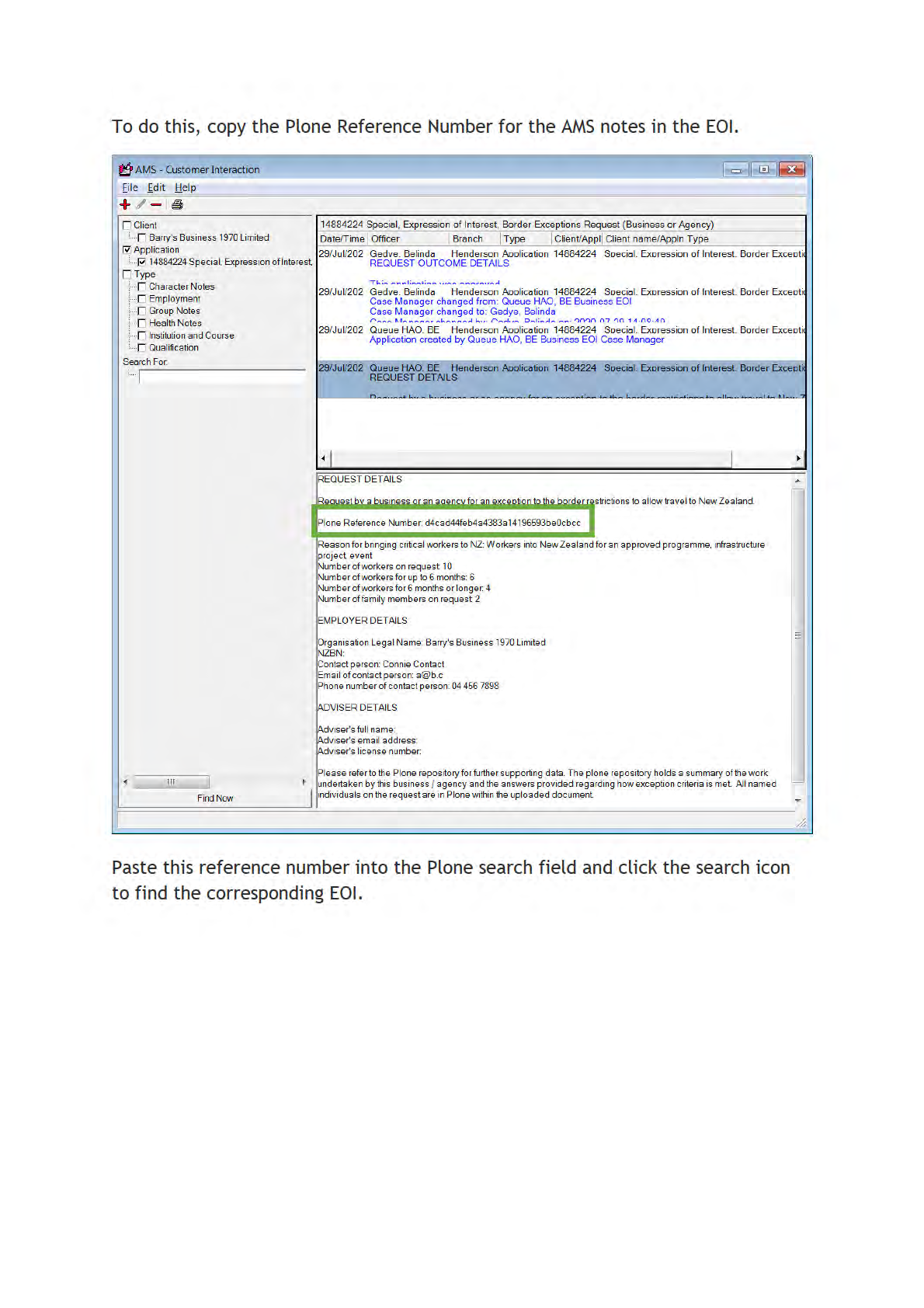
Act
Information
the Official
Released under
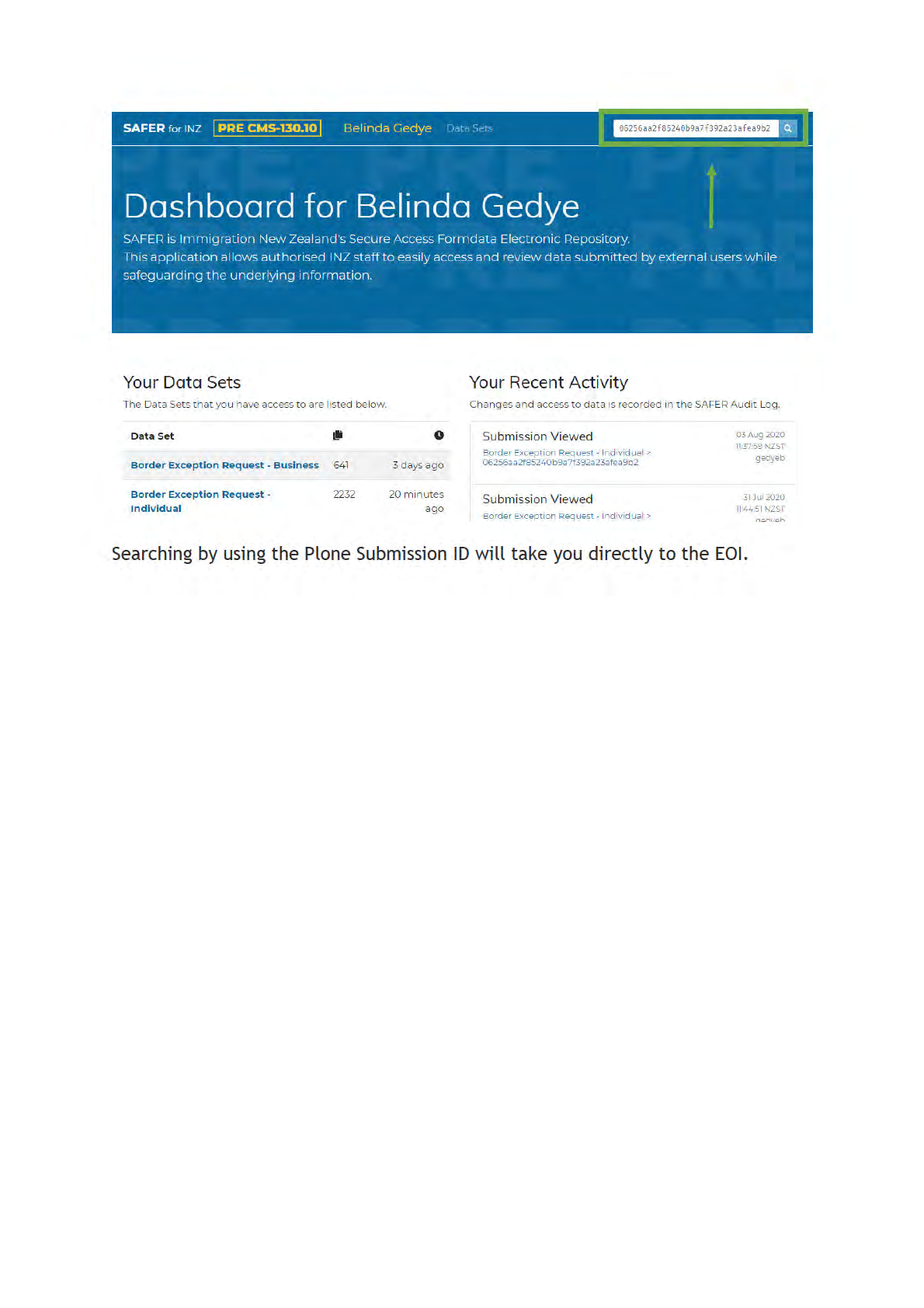
Act
Information
the Official
Released under
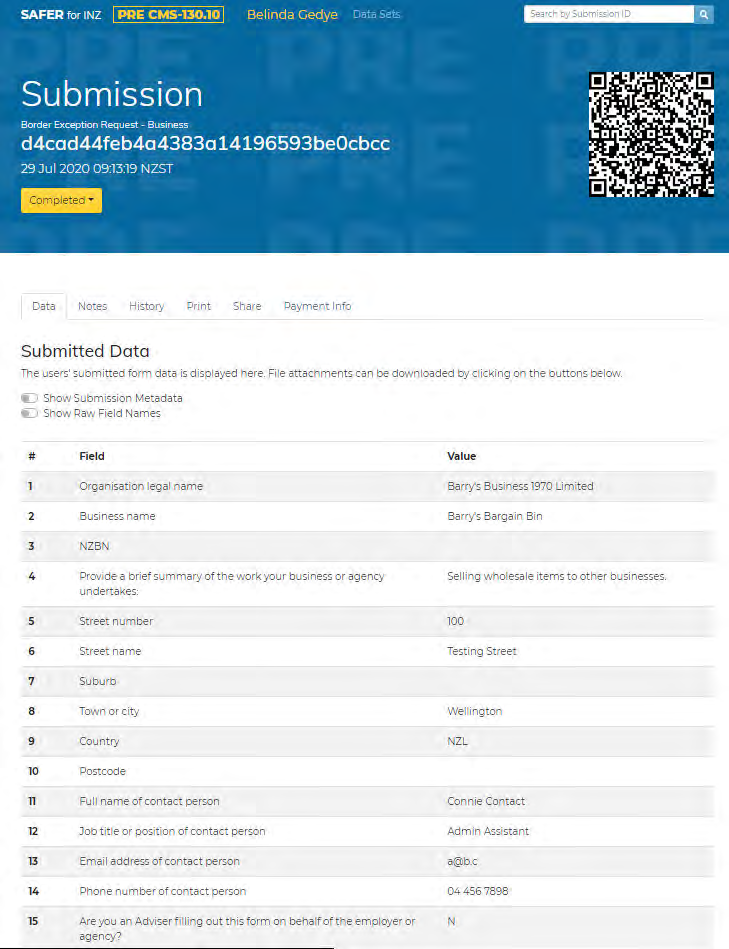
Act
Information
the Official
The key for the codes used throughout the EOI submission can be found here:
http://thelink/content/inzkit/Documents/Country-codes.pdf
To navigate to this page, you select INZ Resources/Border Exceptions.
Note that AMS may have created a new client ID for the client- ensure that the
Released under
client IDs are linked as per normal process.
3. Assess the EOI against relevant immigration instructions in H5.30.5
Assess whether you think immigration instructions have been met and whether an
invitation to apply (ITA) should be issued. Complete the assessment template and
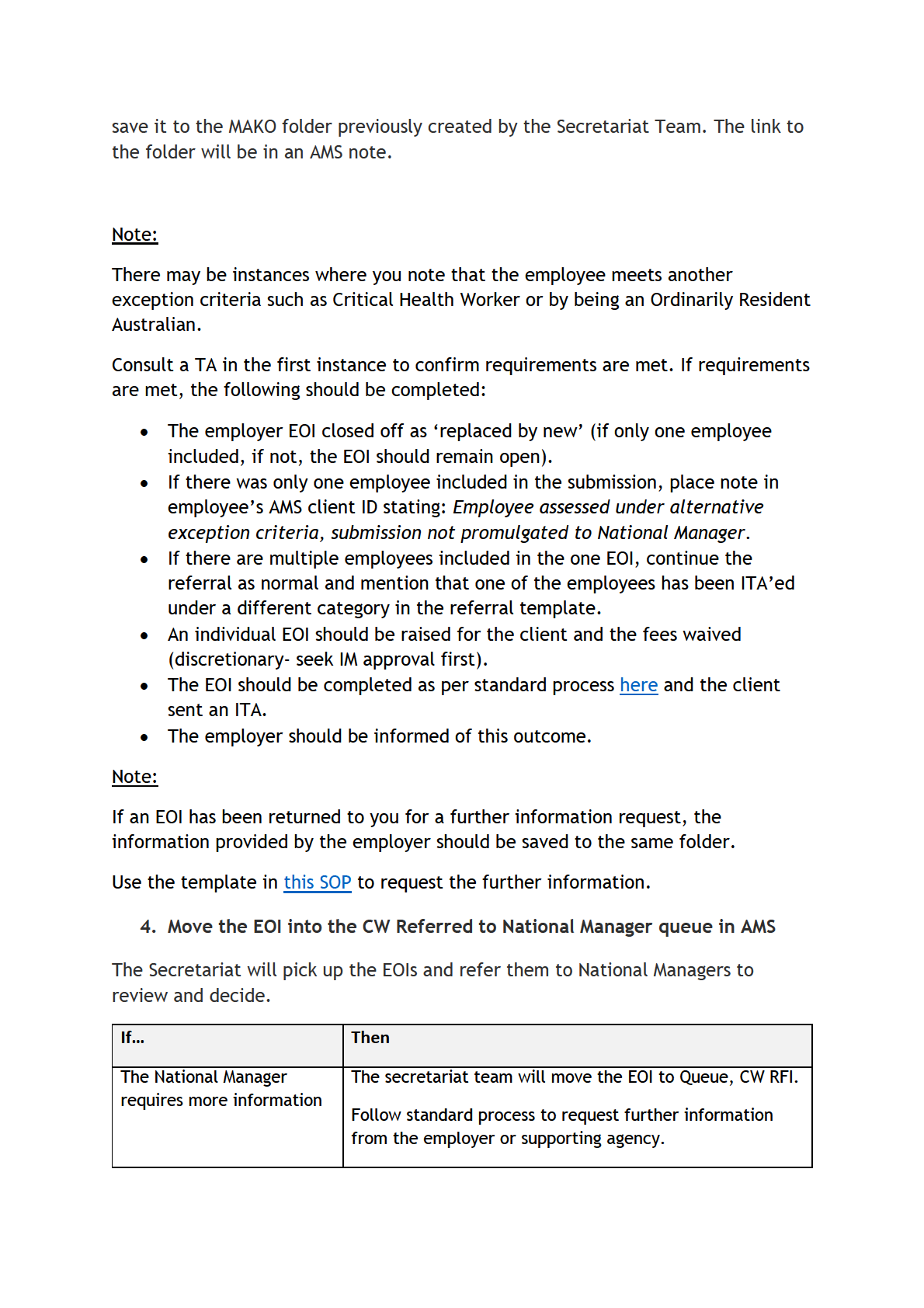
Act
Information
the Official
Released under
Once received, recommence this process.
The National Manager has
The Secretariat will scan the completed referral and save
decided to
approve all
this to MAKO. They will move the EOI to the Critical
workers included in the EOI Worker Approved queue.
The National Manager has
The Secretariat will scan the completed referral and save
decided to
approve some
this to MAKO. They will then use TLS to create a decline
of the workers included in
letter template and notify the employer or supporting
the EOI
agency of the decision.
Act
The Secretariat will also put a list of the declined workers
names in AMS notes.
The Secretariat will then move the EOI to the Critical
Worker Mixed Outcome queue.
The National Manager has
The Secretariat will scan the completed referral and save
decided to
decline all of
this to MAKO. They will then finalise the AMS application
the workers included in the and email the employer or supporting agency to advise of
EOI
the decision.
Information
5. Review the Critical Worker Approved and Critical Worker Mixed Outcome
queue
Support officers will follow this SOP to add the approved workers to the EOI
submission. They will then move the EOI to the CW Approved Workers Added queue
for completion by an Immigration Officer.
the Official
6. Complete the determination questions
Released under
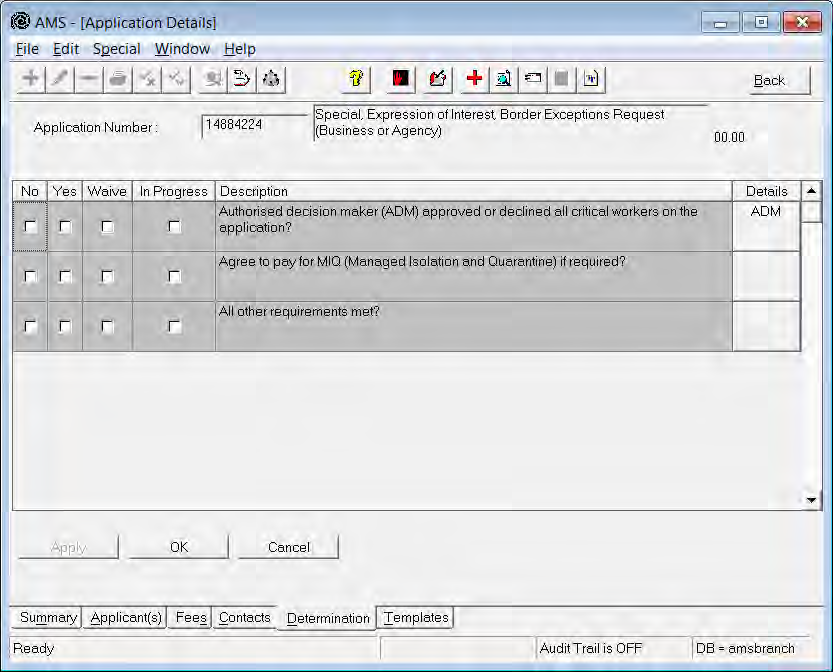
Act
Information
You will need to indicate the number of workers approved and/or declined for this
EOI.
the Official
Released under
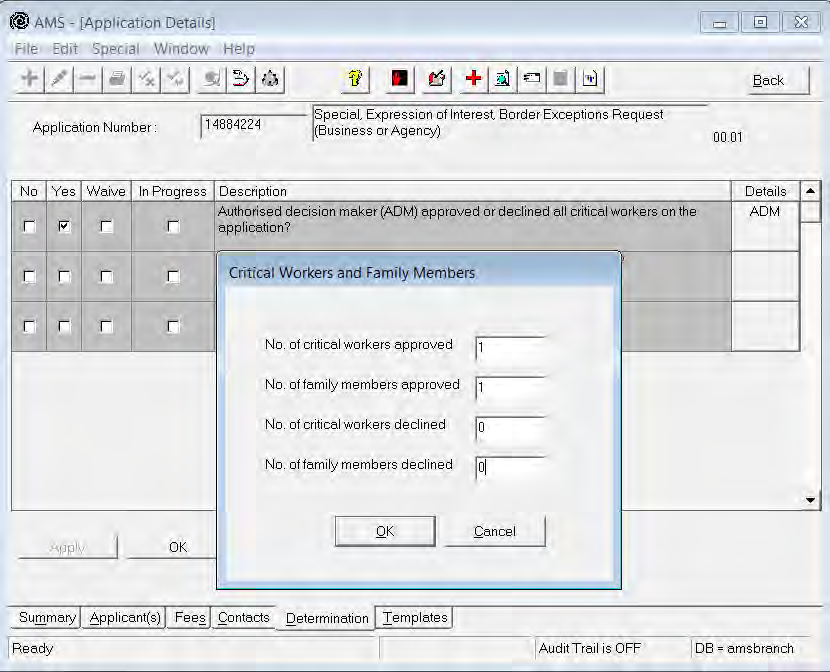
Act
Information
Complete all determination questions and approve the EOI.
the Official
Released under
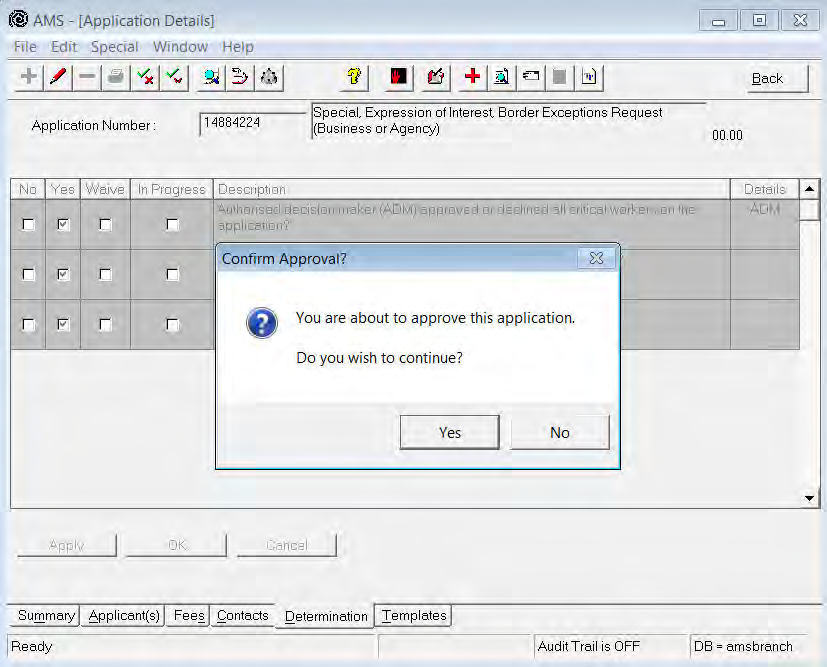
Act
Information
Note: The ITA number is the same as the EOI application number.
the Official
Released under
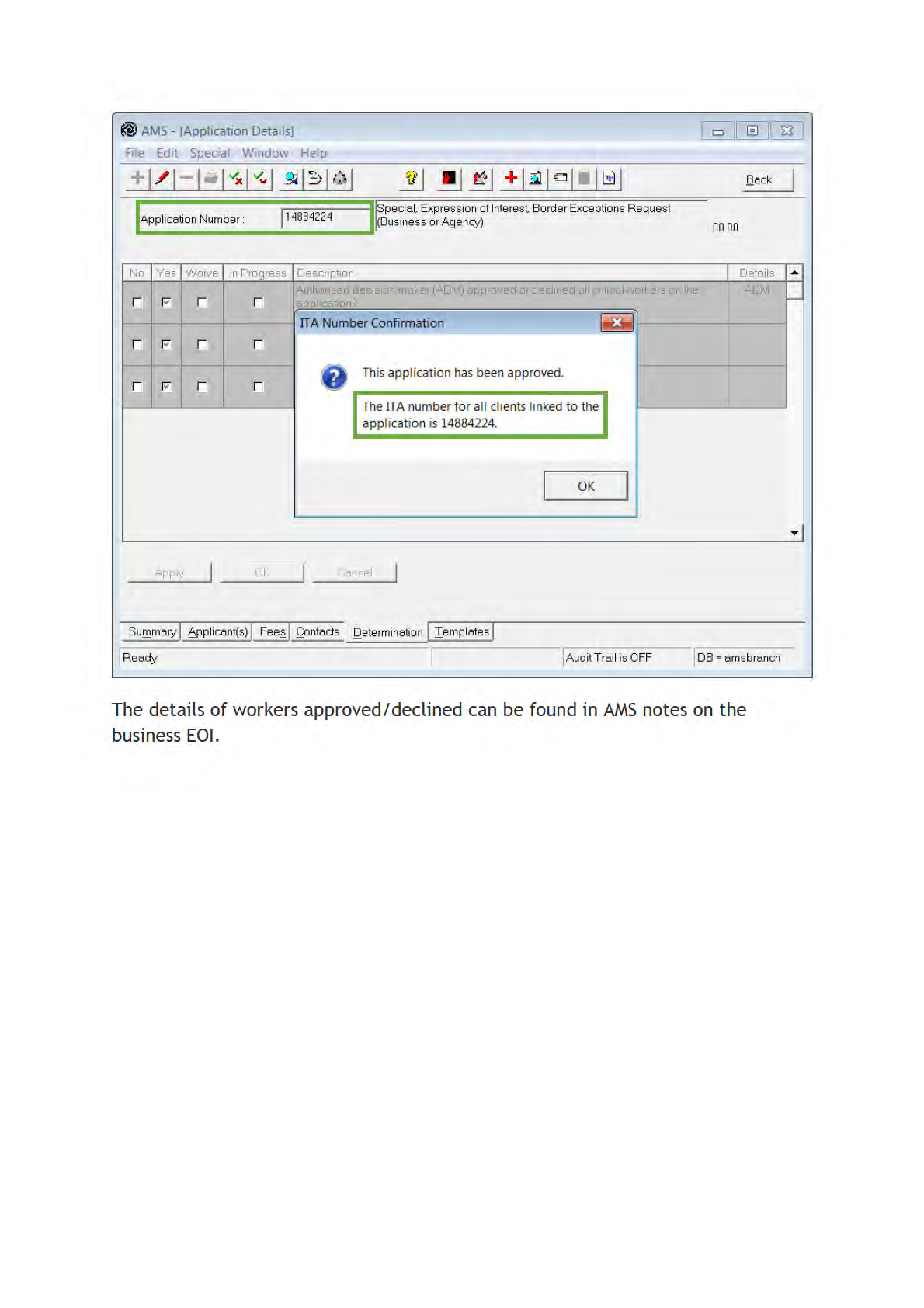
Act
Information
the Official
Released under
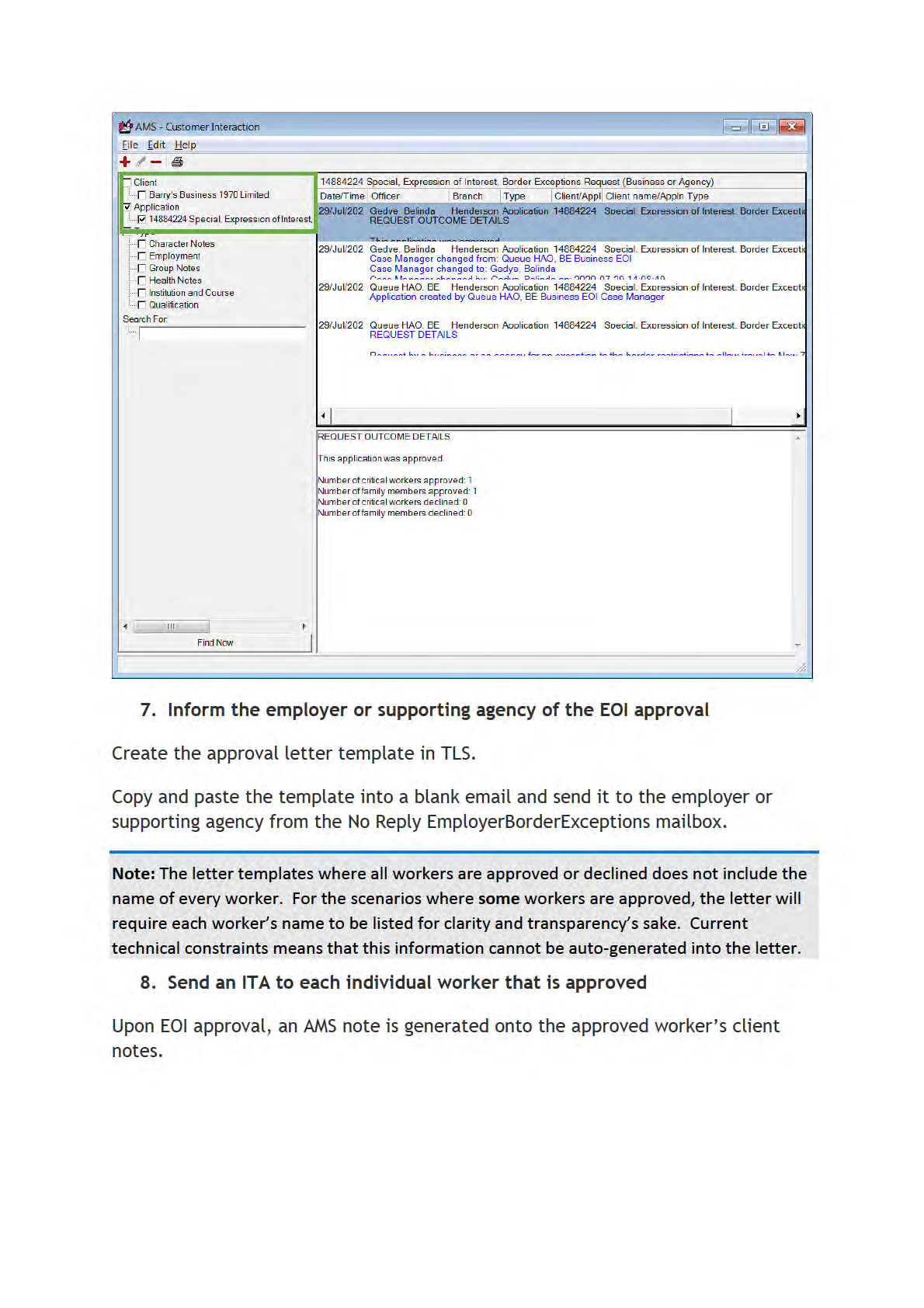
Act
Information
the Official
Released under
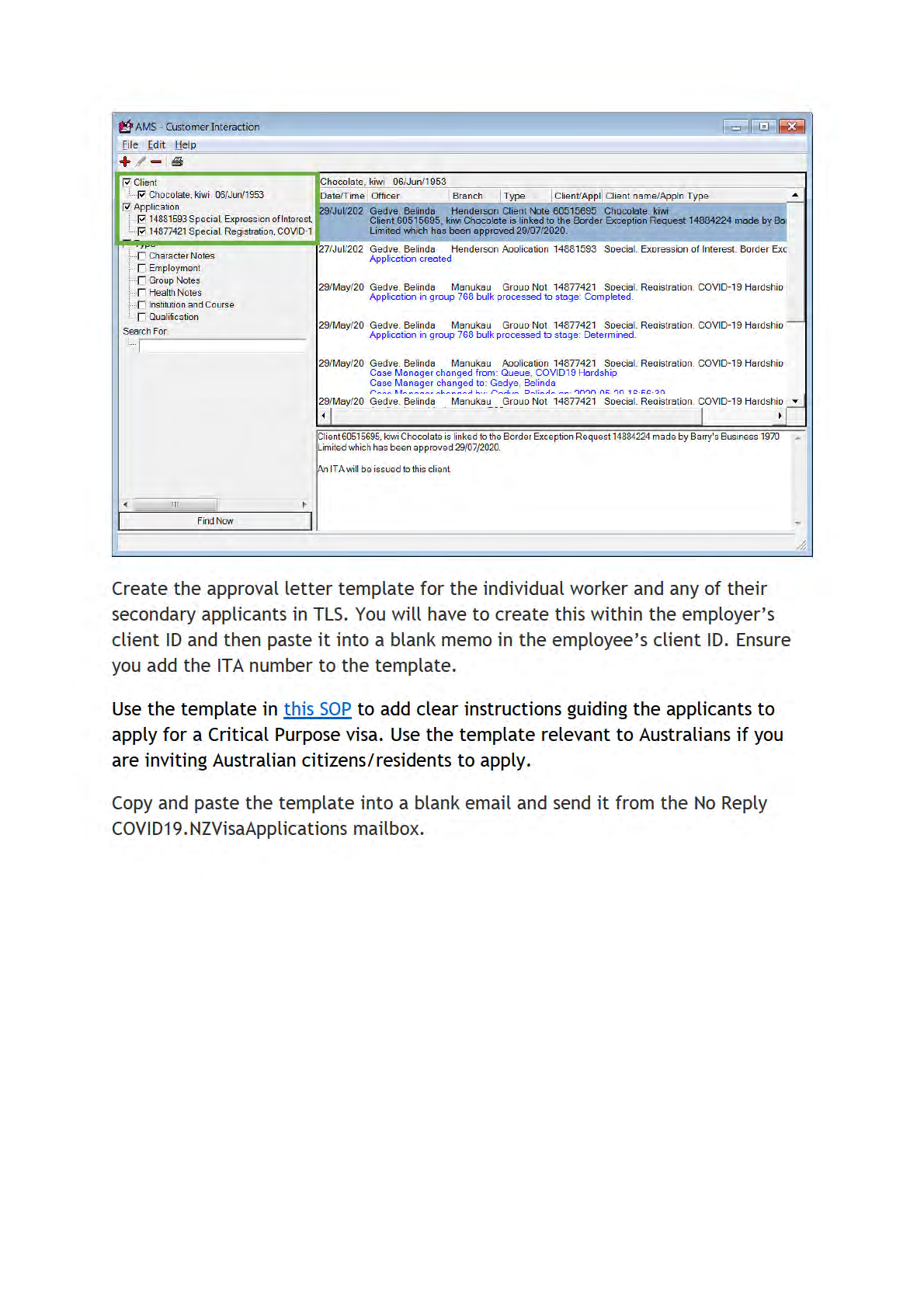
Act
Information
the Official
Released under
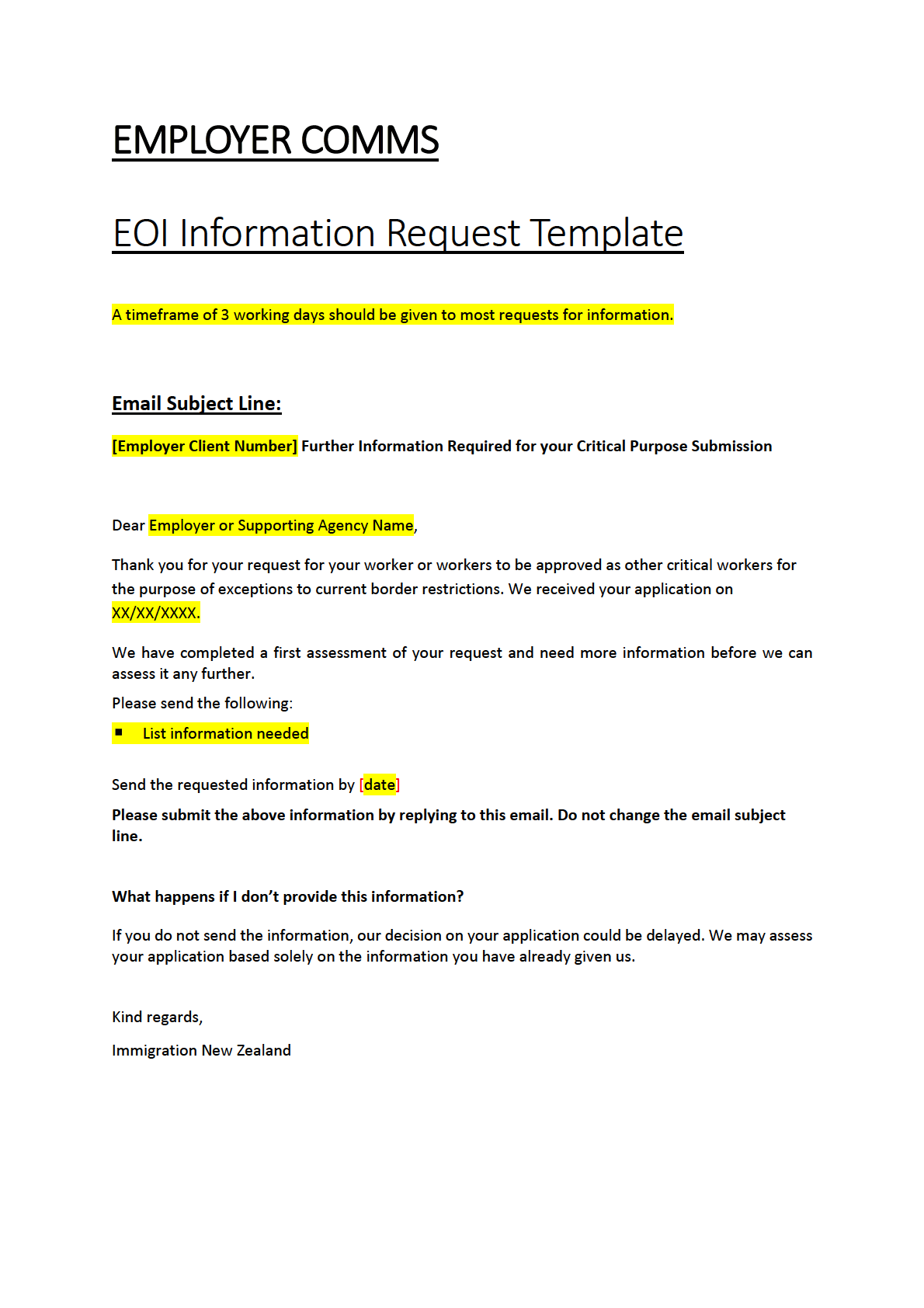
Act
Information
the Official
Released under





























